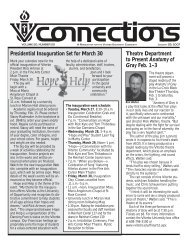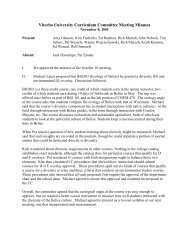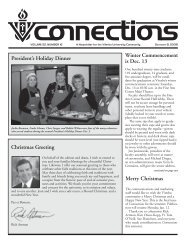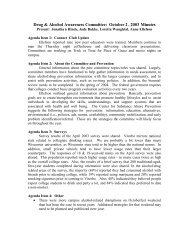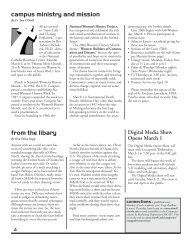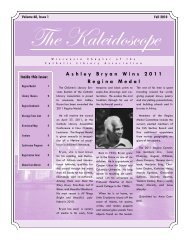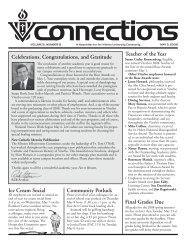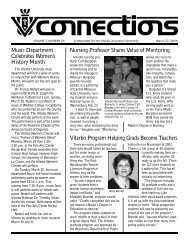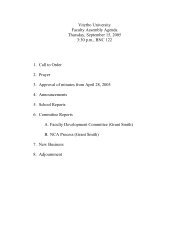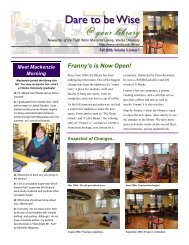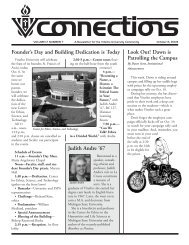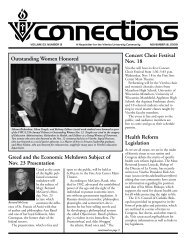1998-2000 - Past and Present - Viterbo University
1998-2000 - Past and Present - Viterbo University
1998-2000 - Past and Present - Viterbo University
Create successful ePaper yourself
Turn your PDF publications into a flip-book with our unique Google optimized e-Paper software.
NATIONAL ADVISORY COUNCIL MINUTES<br />
TUESDAY, SEPTEMBER 22, <strong>1998</strong><br />
Members <strong>Present</strong>: Honorable Shirley Abrahamson; S. Melanie DiPietro, SC;<br />
S. Fran Ferder, FSPA; Robert Froehlke; C. Daniel Gelatt, S. Eleanor<br />
Granger, OSF, John Hansen; Donna Hansen; S. Romana Klaubauf, FSPA; Wayne<br />
Kostroski; A. Diane Moeller; John Mooney; S. Katarina Schuth, OSF; D.<br />
David (Dewey) Sebold; Nola Jo Starling-Ratliff; R. Samuel Sundet<br />
Also <strong>Present</strong>: Kenna Christians; Todd Ericson; Fr. J. Thomas Finucan;<br />
Jack Havertape; S. Alice Kaiser, FSPA; President Medl<strong>and</strong>; Rol<strong>and</strong> (Buzz)<br />
Nelson; Marikay Robers, S. Marlene Weisenbeck<br />
Next Meeting: Tuesday, September 21, 1999 -- 10:00 a.m. - 4:00 p.m.<br />
President Medl<strong>and</strong> welcomed the Council on behalf of the Board of<br />
Directors <strong>and</strong> led the opening prayer.<br />
Bill distributed a packet of information to the Council members<br />
including various bulletins on the topics to be discussed. Also<br />
included were two news releases issued by the public relations<br />
department of <strong>Viterbo</strong> College. The first news release in the packet of<br />
August 28, indicated that the most recent issue of U.S. News <strong>and</strong> World<br />
report indicated that <strong>Viterbo</strong> College ranked number one among regional<br />
Midwest universities <strong>and</strong> liberal arts colleges in graduation performance<br />
rate, a rate designed by U.S. News to capture the effect of a college’s<br />
programs <strong>and</strong> policies on the graduation performance rate of students.<br />
The other news release announced the record enrollment for the tenth<br />
consecutive year. Enrollment at <strong>Viterbo</strong> College for the <strong>1998</strong> fall<br />
semester is 2,098. <strong>Viterbo</strong> College currently is at capacity in<br />
relationship to students <strong>and</strong> its physical campus. This year, <strong>Viterbo</strong><br />
College took in 10% less new students than last year. The president<br />
indicated that there will be a cap placed on undergraduate enrollment as<br />
the college assesses its “right size.”<br />
Tuition Discounting versus Tuition Reduction<br />
The role of tuition discounting in the recruitment of students at<br />
<strong>Viterbo</strong> College generated much discussion. The general consensus at the<br />
end of the discussion was that <strong>Viterbo</strong> should continue to discount its<br />
tuition rather than reduce its tuition. However, as one member stated,<br />
<strong>Viterbo</strong> should insure that high school counselors know about the tuition<br />
discounting.<br />
Several individuals suggested that <strong>Viterbo</strong> College review its mission
<strong>and</strong> vision statements <strong>and</strong> assure that the principles of those statements<br />
are congruent with the procedures that are being followed in tuition<br />
discounting.<br />
Dr. Rol<strong>and</strong> Nelson <strong>and</strong> Mr. Todd Ericson will take it upon themselves to<br />
review our policies <strong>and</strong> procedures regarding tuition discounting <strong>and</strong> our<br />
mission <strong>and</strong> vision statements. The entire tuition discounting<br />
methodology is based upon a very objective basis in that any tuition<br />
discount is based upon a student’s ACT <strong>and</strong> GPA. However, it was noted<br />
by some members that perhaps there could be confusion in discounting if<br />
people believe that everybody gets a scholarship.<br />
Partnering with Business<br />
Bob Dean, Dean of the School of Business, shared some of the ways that<br />
<strong>Viterbo</strong> is partnering in the La Crosse community. The dean indicated<br />
that <strong>Viterbo</strong> College offers internships through Kauffman Entrepreneurial<br />
Grantswhereby students work 250 hours per semester on real jobs in the<br />
La Crosse area.<br />
Members of the Council suggested that there might be ways that<br />
internships might be exp<strong>and</strong>ed. Is there a way to mentor women, female<br />
students in business? Can colleges <strong>and</strong> business be in partnership in<br />
the teaching <strong>and</strong> learning processes?<br />
Management Information Systems<br />
Members of the Council emphasized students going into management<br />
information systems should have the ability to learn more <strong>and</strong> to exp<strong>and</strong><br />
his or her knowledge with the passage of time. The student also needs to<br />
be taught skills in problem solving <strong>and</strong> maintaining the accuracy <strong>and</strong><br />
updatedness of their knowledge. Further, the college should give<br />
attention to a balance within the lives of students <strong>and</strong> not let students<br />
become obsessed with the computer technology. “Cyber-addiction”<br />
awareness is how this was referenced.<br />
<strong>Viterbo</strong> needs to recruit <strong>and</strong> retain competent faculty; recruit<br />
sufficient competent students, <strong>and</strong> provide “real world” learning<br />
experiences to these students. The computer information systems major<br />
may need to be updated to keep pace with progress <strong>and</strong> technology.<br />
The National Advisory Council meeting adjourned at approximately 3:30<br />
p.m. The next Council meeting is Tuesday, September 21, 1999 from 10<br />
a.m. until 4 p.m.
NATIONAL ADVISORY COUNCIL MINUTES<br />
TUESDAY, SEPTEMBER 21, 1999<br />
Next Meeting: Tuesday, September 19, <strong>2000</strong> -- 11:00 a.m. - 3:30 p.m.<br />
Members <strong>Present</strong>: Honorable Shirley Abrahamson; Milton Bevington; S.<br />
Melanie DiPietro, SC; S. Fran Ferder, FSPA; Robert Froehlke; C. Daniel<br />
Gelatt, S. Eleanor Granger, OSF; Donna Hansen; John Hansen; Ron Houser;<br />
S. Ramona Klaubauf, FSPA; Tom Meilinger; A. Diane Moeller; John Mooney;<br />
George Schneider; Virginia Schneider; S. Katarina Schuth, OSF; R. Samuel<br />
Sundet<br />
Also <strong>Present</strong>: Fr. J. Thomas Finucan; S. Alice Kaiser, FSPA; President<br />
Medl<strong>and</strong>; James Senty; Deak Swanson; S. Marlene Weisenbeck<br />
Not <strong>Present</strong>: Richard Campbell; His Eminence Cardinal Keeler; Wayne<br />
Kostroski; Gary Poehling; Tom Schini; D. David Sebold; John Swendrowski<br />
President Medl<strong>and</strong> welcomed the Council on behalf of the Board of<br />
Directors <strong>and</strong> led the opening prayer.<br />
The President distributed a packet of information to the Council members<br />
including various bulletins on the topics to be discussed including<br />
information pertaining to the speakers for the D.B. Reinhart Institute<br />
for Ethics in Leadership for the 1999-<strong>2000</strong> academic year.<br />
Emerging areas for new undergraduate <strong>and</strong> graduate majors?<br />
Dr. Jack Havertape, Academic Vice President, shared information<br />
pertaining to the programs available at <strong>Viterbo</strong> College including<br />
graduate <strong>and</strong> cooperative service programs <strong>and</strong> new undergraduate programs<br />
that are currently being considered (e.g. Social Work).<br />
A suggestion was made that prior to making any changes in the curriculum<br />
<strong>Viterbo</strong> should not only evaluate the dem<strong>and</strong>, but also determine if<br />
<strong>Viterbo</strong> is able to do a first class job in the given changes. A<br />
question was raised as to whether <strong>Viterbo</strong> shares programs with UW-La<br />
Crosse or WWTC. <strong>Viterbo</strong> does not share programs but does share courses<br />
with other institutions including UW-L <strong>and</strong> WWTC. <strong>Viterbo</strong> tries not to<br />
compete directly with programs with other schools in the region.<br />
Other topics discussed were long distance learning over two-way video,
on-line teaching, curriculum differentiation between Bachelor of Science<br />
in Organizational Management <strong>and</strong> Bachelor of Integrated Studies. A<br />
suggestion was made to consider an on-line master’s program in<br />
non-profit management. It was also suggested that an ‘Ethics’ major or<br />
program in ‘Ethics’ be implemented to coincide with D.B. Reinhart<br />
Institute for Ethics in Leadership. Minimally, <strong>Viterbo</strong> should offer a<br />
course that addresses ethics specifically. Jack Havertape did explain<br />
that our students are required to take six credits of religious studies<br />
<strong>and</strong> that ethics is a part of every course taught in the general<br />
education curriculum.<br />
<strong>Viterbo</strong> College or <strong>Viterbo</strong> <strong>University</strong>?<br />
President Medl<strong>and</strong> posed the question whether <strong>Viterbo</strong> College should<br />
retain its name or change the name to <strong>Viterbo</strong> <strong>University</strong>. <strong>Viterbo</strong><br />
College is considered a comprehensive II university by the U.S.<br />
Department of Education. Several reasons were given by the President<br />
both to retain the name of <strong>Viterbo</strong> College as well as to change the name<br />
to <strong>Viterbo</strong> <strong>University</strong>. The estimated cost to change the name is<br />
$30,000; the by-laws of the college would not need to be revised, <strong>and</strong><br />
the mission <strong>and</strong> vision of <strong>Viterbo</strong> College would remain as they are. It<br />
was noted that at the college forum there was virtually no opposition to<br />
the name change; alumni have been presented with the question with<br />
little to no opposition; <strong>and</strong> the Franciscan Sisters of Perpetual<br />
Adoration are in support of the change to <strong>Viterbo</strong> <strong>University</strong>.<br />
At the suggestion of John Mooney, a poll was taken of the National<br />
Advisory Council with an overwhelming majority in favor of the name<br />
change from <strong>Viterbo</strong> College to <strong>Viterbo</strong> <strong>University</strong>. There were 20 in<br />
favor, one opposed, <strong>and</strong> two neutral.<br />
What is the future of liberal arts colleges in meeting the needs of an<br />
ever-changing <strong>and</strong> career-oriented society?<br />
According to Peter Drucker, small liberal arts institutions, except for<br />
a few that have a national recognition, will cease to exist in the next<br />
ten years. What can or should <strong>Viterbo</strong> do?<br />
<strong>Viterbo</strong> College believes that students may learn better by a different<br />
delivery system such as two courses in an eight-week block. However,<br />
there are more perspectives to consider than that of Peter Drucker.<br />
What are the employment levels of <strong>Viterbo</strong> graduates? What is the<br />
environment within the campus community? Are people getting their<br />
money’s worth? As long as <strong>Viterbo</strong> continues transforming itself <strong>and</strong>
meeting the needs of society, the size or the nature could be viable.<br />
The college must continue to fulfill its mission.<br />
With respect to Peter Drucker’s statement <strong>and</strong> the term ‘Liberal Arts’,<br />
some people had the view that the courses are being diluted. ‘Liberal<br />
Arts’ remain critical to a good education. Question: What is a ‘Liberal<br />
Arts’ education now <strong>and</strong> what credibility does it hold within the job<br />
market?<br />
Prepaid tuition plans <strong>and</strong> Taxpayer Relief Act of ‘97<br />
If <strong>Viterbo</strong> College informs parents <strong>and</strong> others of the existence of the<br />
pre-paid tuition plans or tuition savings programs, that is sufficient.<br />
<strong>Viterbo</strong> should be sure not to use a guaranteed tuition rate for future<br />
years. This could be very dangerous to the future financial viability<br />
of the college.<br />
The National Advisory Council meeting adjourned at approximately 3:10<br />
p.m. The next Council meeting is Tuesday, September 19, <strong>2000</strong> from 11:00<br />
a.m. until 3:30 p.m.<br />
Please feel free to suggest future topics that the National Advisory<br />
Council may wish to address.
NATIONAL ADVISORY COUNCIL MINUTES<br />
SEPTEMBER 19, <strong>2000</strong><br />
Next Meeting: Tuesday, September 18, 2001 -- 12:15 p.m. - 3:30 p.m.<br />
Members <strong>Present</strong>: Honorable Shirley Abrahamson; Richard Campbell; Robert<br />
Froehlke; C. Daniel Gelatt, John Hansen; Ronald Houser; S. Ramona<br />
Klaubauf, FSPA; Wayne Kostroski; S. Grace McDonald, FSPA; Marikaye<br />
Robers; Thomas Schini; R. Samuel Sundet<br />
Also <strong>Present</strong>: Todd Ericson; Fr. J. Thomas Finucan; Mark Franz; Jack<br />
Havertape; S. Alice Kaiser, FSPA; Pat Kerrigan; President William<br />
Medl<strong>and</strong>; S. Marlene Weisenbeck, FSPA<br />
Not <strong>Present</strong>: Milton Bevington; S. Melanie DiPietro, SC; S. Fran Ferder,<br />
FSPA; S. Eleanor Granger, OSF; His Eminence Cardinal Keeler; Tom<br />
Meilinger; A. Diane Moeller; John Mooney; Gary Poehling; George<br />
Schneider; Virginia Schneider; S. Katarina Schuth, OSF; D. David Sebold;<br />
John Swendrowski<br />
President Medl<strong>and</strong> welcomed the Council <strong>and</strong> led the opening prayer, the<br />
Prayer of Saint Francis.<br />
President Medl<strong>and</strong> distributed a packet of information to the Council<br />
members including the President’s Report 1999-<strong>2000</strong>, VISION 2005, <strong>and</strong> the<br />
booklet A New Image for a New Millennium.<br />
Jack Havertape began the meeting by stating that <strong>Viterbo</strong> <strong>University</strong> has<br />
been integrating technology into the classrooms for several years. This<br />
past summer faculty were trained on a new web enhanced teaching package<br />
entitled “Blackboard”. Jack then introduced Mr. David Schulz, an<br />
instructor in the School of Business, to demonstrate the “Blackboard”<br />
program.<br />
Mr. Schulz explained the difference between distance education <strong>and</strong><br />
web-enhanced coursework. Distance education has students all over the<br />
country <strong>and</strong> the instructor on a single campus; web enhanced coursework<br />
is use of the web to enhance the classroom coursework with students <strong>and</strong><br />
instructor on campus in the classroom. Web enhanced coursework can<br />
extend outside the classroom by enticing students to attend <strong>Viterbo</strong><br />
<strong>University</strong> via entering the <strong>Viterbo</strong> web page for course offerings,<br />
syllabi, faculty listings, etc.
“Blackboard”, the web enhanced program purchased by <strong>Viterbo</strong>, allows the<br />
instructor to post announcements, the day’s calendar agenda, tasks for<br />
the day for each class, <strong>and</strong> class notes for each course offered by the<br />
particular professor.<br />
Mr. Schulz explained the possible need of “Dumbing Down” classrooms to<br />
meet the perceived reality of available resources. Mr. Schulz stated<br />
that by using “Blackboard” as a teaching tool the professor is able to<br />
be more efficient <strong>and</strong> cognizant of student’s work. Using “Blackboard”,<br />
he demonstrated the use of computers in the classroom. Since notes can<br />
be posted to the web, a student does not need to take notes during<br />
class; thus, the student is better able to pay attention to the subject<br />
matter <strong>and</strong> interact in the classroom discussion. The student may read<br />
or print the daily classroom discussion notes from “Blackboard”.<br />
Students can take practice quizzes with immediate correction of the<br />
given answers. Instructors can view the scores of the quizzes for each<br />
student. Students may view their own scores <strong>and</strong> grades throughout the<br />
semester including the final test that is take on the computers. With<br />
immediate correction of the final test, the score will be given for the<br />
test, immediately post to the grade book, <strong>and</strong> calculate the final<br />
grade. In this way, the student will know the final grade without<br />
having to wait for the instructor to correct the test <strong>and</strong> post the<br />
grade.<br />
Within “Blackboard”, as a requirement of the coursework <strong>and</strong> final grade,<br />
an instructor may post questions in the “discussion board” for<br />
students. This may be done by asking all students to participate on the<br />
same question/topic, or the instructor may direct certain<br />
questions/topics to certain individuals <strong>and</strong> check on the interaction of<br />
each student. The instructor also may notify students, via the web, of<br />
time he/she is available to chat on the web; thus allowing students to<br />
ask questions of the instructor with immediate responses, outside of<br />
classroom hours.<br />
Mr. Schulz reported that he had attended a syllabus conference with<br />
educators from around the world. He stated that <strong>Viterbo</strong> is considered a<br />
leader in utilizing technology. Other major institutions are just<br />
beginning to look at the available tools. A question asked of Mr.<br />
Schulz at the conference was ‘how does <strong>Viterbo</strong> get the faculty to “buy<br />
in” on the use of technology?’ Are there financial incentives to<br />
faculty to attend the training <strong>and</strong> use of “Blackboard”? Jack noted that<br />
approximately 70 percent of <strong>Viterbo</strong> faculty are currently using<br />
“Blackboard”. There are financial incentives given to faculty for the<br />
training <strong>and</strong> use of “Blackboard”. Jack mentioned that the faculty<br />
actually are proud to mention that they use “Blackboard”, <strong>and</strong> students<br />
also have responded favorably to the technology.
“Blackboard” increases the workload for faculty as well as the students,<br />
thus the question access arises. Are there enough computers at <strong>Viterbo</strong><br />
for the faculty <strong>and</strong> students to access the necessary information for<br />
each course offered via “Blackboard”? And, do the students <strong>and</strong> faculty<br />
have the necessary ability to use a computer to access the coursework<br />
<strong>and</strong> utilize “Blackboard” for coursework instruction?<br />
President Medl<strong>and</strong> reported results from a student poll among high school<br />
seniors that plan to attend college. According to the poll, 94 percent<br />
of the students will have access by the end of this year. Ninety-three<br />
percent of students have access both in school <strong>and</strong> at home. All<br />
students with a household income of $100,000 or more have access to a<br />
computer; fifty percent of the students with a household income of<br />
$50,000 also have access.<br />
Jack Havertape responded to questions by stating that the faculty is<br />
eager to receive the training <strong>and</strong> implement “Blackboard” into their<br />
course of instruction. The access to computers is the concern here at<br />
<strong>Viterbo</strong>. <strong>Viterbo</strong> has only four computer labs intended for student use.<br />
Now faculty are taking more time on those computers in the labs, <strong>and</strong><br />
therefore leaving the students with less accessibility.<br />
Mark Franz, the Director of Computer Services, mentioned that the<br />
chemistry class is utilizing computers for molecular modeling, <strong>and</strong><br />
history classes view video clips <strong>and</strong> documents on the computers. With<br />
more access to the computers being required by professors for<br />
coursework, <strong>Viterbo</strong> no longer has adequate access for student use. Mark<br />
also stated that twenty classrooms on campus have podiums with access to<br />
the web for instructors’ use during class, <strong>and</strong> that every classroom is<br />
wired as well as most of the residence rooms.<br />
Questions: How does <strong>Viterbo</strong> increase access? If <strong>Viterbo</strong> increases the<br />
need for computers, should <strong>Viterbo</strong> buy or lease the computers necessary<br />
to fulfill the accessibility?<br />
According to Jack Havertape, Seton Hall charges students $1,000 each<br />
year for the use of a computer. This would increase tuition the first<br />
year by that amount. This also would require an increase in faculty <strong>and</strong><br />
computer personnel to adequately h<strong>and</strong>le the necessary maintenance on the<br />
additional computers.<br />
Todd Ericson, Vice President for Finance, noted that this increase would<br />
become a part of the cost of attending <strong>Viterbo</strong>. When increasing the<br />
financial need, there is also an increase in financial aid<br />
expenditures. There are cost considerations as to what kind of
computers would be purchased or leased, laptops or desktops, hardware<br />
costs, <strong>and</strong> the “turn over” rate of the computers to keep them up to<br />
date, knowing that the “turn over” rate is approximately two years; for<br />
word processing use only, the rate is three to five years. Each of<br />
these questions will need to be answered prior to making a final<br />
decision. An increase of approximately five employees would be<br />
necessary in the computer department, <strong>and</strong> <strong>Viterbo</strong> would need to adopt a<br />
single platform for ease of repair, etc.<br />
A question was raised as to why would a student need to attend class if<br />
he or she were using “Blackboard” for coursework. The answer is that<br />
classroom attendance is a requirement of each course <strong>and</strong> students learn<br />
from students.<br />
Jack Havertape noted that the completion rate for an on-line course is<br />
very low except among people who have a specific reason to take an<br />
on-line course. Those few people are more determined to complete the<br />
coursework so as to obtain a degree.<br />
Daniel Gelatt stated that it seemed the network <strong>and</strong> equity issues are<br />
more important than to complete high speed access to all students on<br />
campus or at home. He also asked if <strong>Viterbo</strong> could get special<br />
contractual agreements for the necessary equipment.<br />
Robert Froehlke said that he believes a good place to start the<br />
implementation would be within the business program. He reasoned this<br />
on the belief that getting into the workplace in a business field<br />
required one to be computer literate.<br />
Thomas Schini inquired as to how <strong>Viterbo</strong> makes certain that the faculty<br />
keep their “Blackboard” information current? Jack Havertape answered<br />
that this is included in the faculty annual evaluation. He also stated<br />
that it would be rather embarrassing to the faculty member should<br />
students not be able to access the necessary class discussion notes,<br />
daily calendar, or coursework tasks.<br />
A question was posed to the Council whether to use laptops or desktops.<br />
Responses were that desktops are half the price of laptops; laptops can<br />
be used in the classroom <strong>and</strong> can be taken with the student; a desktop is<br />
stationary <strong>and</strong> not as flexible.<br />
If <strong>Viterbo</strong> decided favorably in implementing computer usage campus wide,<br />
this would be seen as an enhancement to the formal degree as all<br />
graduates would be computer literate in the field in which they<br />
graduate.
Jack Havertape took a “straw poll” on the question: who believe that<br />
<strong>Viterbo</strong> should require computers in the next three to four years?<br />
Approximately half of the Council members voted favorably. A suggestion<br />
was made to implement a pilot program first, such as with business<br />
majors, or to implement a pilot program with only juniors <strong>and</strong> seniors.<br />
It was the consensus that there was not enough information obtained to<br />
vote on a question of whether to lease or buy the necessary equipment.<br />
In answering the question as to how to increase access without any<br />
additional classroom space or labs available, Council members suggested<br />
finishing the wiring of the dorms first. However, this does not satisfy<br />
the need of the off campus students; it was suggested that a student<br />
loan from the university may be available for the financially needy.<br />
After the break, the topic of <strong>Viterbo</strong>’s presence on the web was<br />
addressed. Jack Havertape stated that Harvard has online degrees <strong>and</strong><br />
Lakel<strong>and</strong> College in Sheboygan has full courses on the web. <strong>Viterbo</strong><br />
currently has students who drive 250 miles to class one evening a week.<br />
With the use of the web, students would not need to travel to campus.<br />
This would be particularly helpful in the Graduate Program in Education,<br />
<strong>and</strong> in the RN to BSN program.<br />
Is there a market for online courses? Suggestions were to do a market<br />
survey, to not offer online courses to undergraduates, <strong>and</strong> to offer<br />
online course only to non-traditional adult undergraduates.<br />
The National Advisory Council meeting adjourned at approximately 3:35<br />
p.m.



